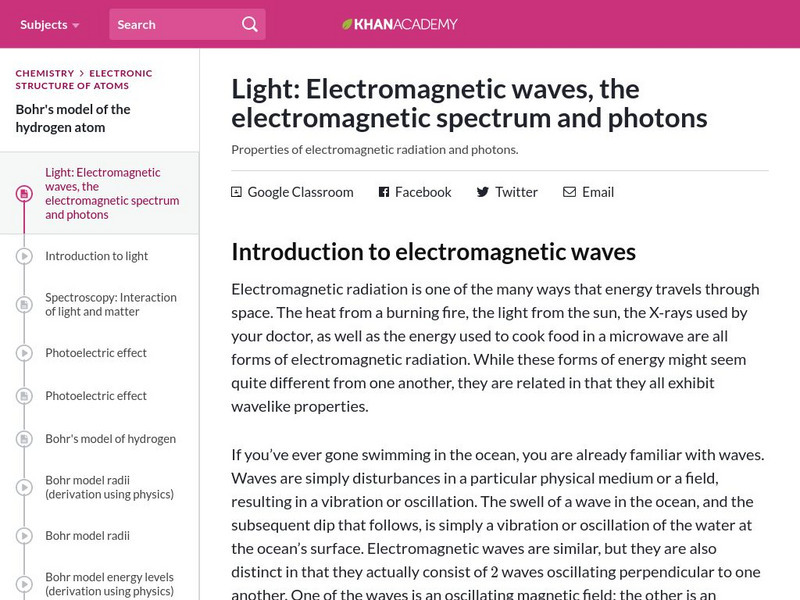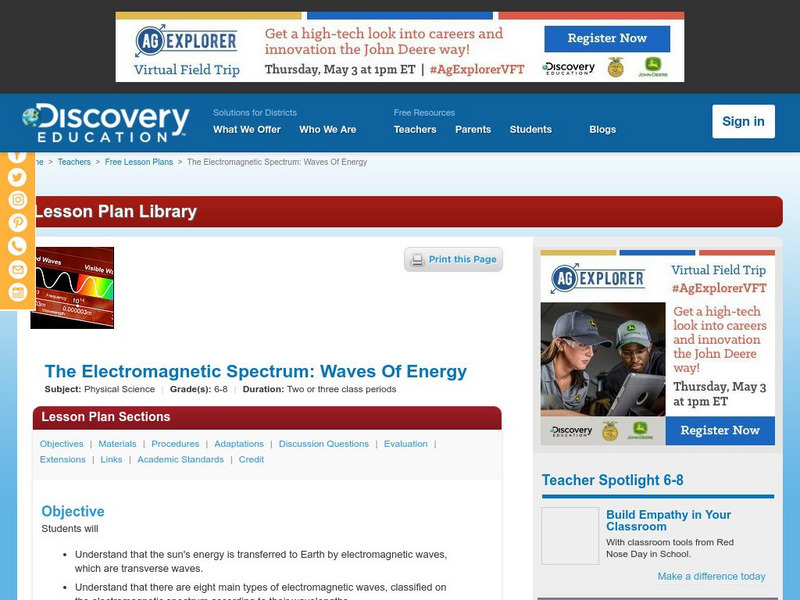Curated OER
What You See Is What You Get
Students explore light and colors. They see how white light is made up of various colors. They need to have some background knowledge about prisms, light wave lengths, and behavior of light, primary and secondary colors, and ratios.
Curated OER
The Lighter Side of Color
Students explore light and color, including how colors are mixed to produce new colors, how light is filtered, and how light is reflected off of surfaces. They read materials provided, complete worksheets, and complete hands-on activities.
Curated OER
All Those Seeing Color, Say Eye!
Students discuss feelings and explore how to recognize how they are feeling. In this exploratory lesson students discuss conflict and ways to resolve problems.
Curated OER
Exploring Solar Beads
Students discover solar energy beads and learn about ultraviolet light. In this solar energy lesson, students learn about solar energy beads, ultraviolet light, and UV radiation dangers. Students experiment with the beads to identify.
NASA
The Atmospheric Filter
What is the difference between a comet and a meteoroid? An educational lesson includes five demonstrations of how the atmosphere can inhibit our ability to measure many things in the galaxy.
Curated OER
Radiation from Space
In this radiation worksheet, high schoolers review the different types of radiation waves that come from space and the different telescopes used to detect this radiation. This worksheet has 17 true or false questions.
Curated OER
Summer Research Program for Science Teachers
Students analyze the optical region of the electromagnetic spectrum.
Curated OER
Naturally Magnetic Elements
Students explore naturally magnetic elements. In this magnets lesson, students examine the periodic table of elements. Students discover the parts of an atom and determine which three elements are magnetic.
Curated OER
Lenses
Young scholars explore vision by experimenting with lenses in equipment. In this optics activity, students define the different technology that enhances vision such as microscopes, telescopes and cameras. Young scholars experiment with...
Curated OER
To See or Not to See
Students identify and discuss key factors that determine how effective color camouflage is in certain habitats. In this investigative lesson students divide into groups and study light.
Curated OER
Ways to See the Sun
Students examine how the regions of the Sun are studied using spectroscopy. They investigate the electromagnetic spectrum and the types of radiation that are associated with it. They use prisms and CD's to examine the light spectrum....
Curated OER
All Those Seeing Color, Say Eye!
Learners research and discuss the roles of the eye and brain in the perception of color. They watch a slideshow and complete a worksheet.
Curated OER
(S-4) The Many Colors of Sunlight
Students observe and explore the characteristics of light.
Curated OER
Examining Spectra
Learners examine the spectra with the use of light while constructing their own spectroscope. They make observations about the colors and visible wavelengths of light and then conduct classroom discussions. As an extension students read...
Curated OER
Enlightening Explorations, Part III
Sixth graders continue their examination of light. In groups, they make rainbows and examine the spectrum of visible light. They travel between various stations recording their observations about the behaviors of light. To end the...
Curated OER
Physics- global warming
Students discuss the concept of global warming and view a multimedia clip on the global warming phenomenon. They statistically analyze mean temperature data and compare a given set of data. Data on atmospheric CO2 is done then they...
Khan Academy
Khan Academy: Electromagnetic Waves: The Electromagnetic Spectrum and Photons
An article that discusses the coupling of an electric field with a magnetic field to create electromagnetic waves. Article also discusses how different types of electromagnetic waves have different wavelengths which forms the...
Discovery Education
Discovery Education: The Em Spectrum: Waves of Energy
Students are introduced to the electromagnetic spectrum through this group research activity. Each group investigates a different wavelength range within the em spectrum and reports back to class. Discussion ideas also included.
PBS
Pbs Learning Media: The Electromagnetic Spectrum: Frontline
This video segment adapted from FRONTLINE introduces the electromagnetic spectrum and explains how the various types of electromagnetic waves are distinguished by the amount of energy each wave carries.
Georgia State University
Georgia State University: Hyper Physics: Wave Particle Duality
The dualistic nature of light is discussed. The photoelectric effect and the Davisson-Germer experiment are contrasted as empirical evidence supporting each of the two views - particle and wave - of the nature of light. The photoelectric...
TeachEngineering
Teach Engineering: Exploring the Electromagnetic Spectrum
Students learn the basics of the electromagnetic spectrum and how various types of electromagnetic waves are related in terms of wavelength and energy. In addition, they are introduced to the various types of waves that make up the...
TeachEngineering
Teach Engineering: Light It Up
Through an introduction to the design of lighting systems and the electromagnetic spectrum, students learn about the concept of daylighting as well as two types of light bulbs (lamps) often used in energy-efficient lighting design....
Physics Classroom
The Physics Classroom: The Electromagnetic and Visible Spectra
A tutorial on the electromagnetic and visible spectra. Discusses dispersion and how perceptions of white and black are related to the visible light spectrum.
Khan Academy
Khan Academy: Light: Electromagnetic Waves, Electromagnetic Spectrum and Photons
This article discusses the properties of electromagnetic radiation and photons.






















